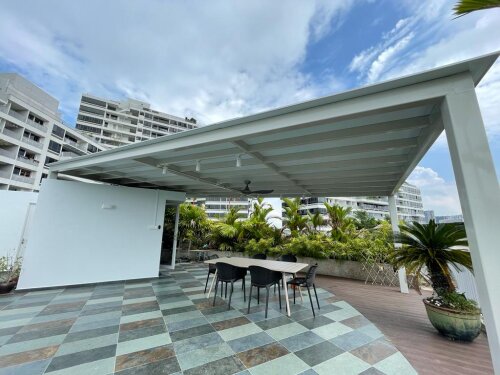Best Natural Resources Lawyers in City Hall
Share your needs with us, get contacted by law firms.
Free. Takes 2 min.
List of the best lawyers in City Hall, Singapore
About Natural Resources Law in City Hall, Singapore
Natural resources law in City Hall, Singapore deals with the legal and regulatory framework that governs the management, use, and protection of natural resources. These resources include land, water, minerals, and energy resources, as well as conservation efforts related to biodiversity and environmental sustainability. Singapore’s approach to natural resources is heavily influenced by its commitment to sustainability and balancing development with environmental conservation. The government has instituted various policies and laws aimed at ensuring the responsible use of natural resources to support long-term ecological balance and economic prosperity.
Why You May Need a Lawyer
There are several scenarios where individuals or businesses may require legal assistance in the realm of natural resources in Singapore. These include:
- Compliance with environmental regulations and legislation.
- Obtaining permits or licenses for the use of natural resources.
- Navigating land use and zoning laws.
- Participating in public consultations or hearings on environmental projects.
- Handling disputes related to natural resource exploitation or conservation.
- Engaging in transactions involving the acquisition or sale of land or resources.
- Ensuring adherence to sustainability and conservation guidelines.
Local Laws Overview
The legal landscape concerning natural resources in City Hall, Singapore, is characterized by a robust regulatory framework that covers several key areas:
- Environmental Protection and Management Act (EPMA): This act serves as the cornerstone of environmental regulation, covering air, water, and land pollution control, as well as waste management.
- Parks and Trees Act: This law governs the conservation of public parks and the management of trees, supporting the city’s green space initiatives.
- Building and Construction Authority (BCA) Policies: These policies ensure sustainable building practices, resource efficiency, and environmental sustainability in construction.
- Land Use Planning under the Urban Redevelopment Authority (URA): The URA oversees the sustainable management and development of land resources to balance urban growth with environmental preservation.
Frequently Asked Questions
1. What are the main environmental laws in Singapore?
They include the Environmental Protection and Management Act, the Parks and Trees Act, and various regulations under the Urban Redevelopment Authority.
2. How can I ensure compliance with environmental regulations?
Consulting with a legal expert in natural resources can help you understand the requirements and navigate the necessary compliance procedures effectively.
3. What permits are needed for land development?
You will typically need development approval from the Urban Redevelopment Authority and possibly environmental impact assessments, depending on the project scale.
4. Can I appeal against land use decisions made by authorities?
Yes, there are procedures in place for challenging or appealing decisions, usually requiring legal representation to navigate the complexities.
5. What is the role of the National Environment Agency (NEA)?
NEA is involved in implementing policies for environmental protection like pollution control and waste management.
6. How do conservation laws affect property development?
Conservation laws may impose restrictions to protect natural habitats, historical landmarks, and green spaces, impacting property development plans.
7. What is the penalty for non-compliance with environmental laws?
Penalties can include fines, revocation of licenses, and possible criminal charges, depending on the severity of non-compliance.
8. Are there incentives for sustainable practices?
Yes, the Singapore government offers various incentives, such as grants and tax benefits, to encourage sustainable resource management and green building practices.
9. Who oversees natural resources regulation?
Several bodies like the NEA, URA, and the Ministry of the Environment and Water Resources oversee different aspects of natural resources regulation.
10. How can public participation impact environmental policies?
Public consultations allow citizens to voice concerns and objections, influencing environmental policy decisions.
Additional Resources
Here are some useful resources and organizations for individuals seeking more information or legal advice in natural resources:
- National Environment Agency (NEA): Focuses on environmental sustainability and public health.
- Urban Redevelopment Authority (URA): Responsible for comprehensive urban planning to ensure sustainable development.
- Building and Construction Authority (BCA): Promotes green building policies and standards.
- Singapore Environment Council: Provides environmental resources and conducts public education campaigns.
- Law Society of Singapore: Can help you find legal professionals specializing in environmental and natural resources law.
Next Steps
If you find yourself in need of legal assistance regarding natural resources in City Hall, Singapore, consider the following steps:
- Identify the specific issue or area in which you need legal advice.
- Reach out to a lawyer specializing in environmental or natural resources law for a consultation.
- Gather all relevant documents and information to facilitate a comprehensive legal review.
- Consider engaging with resource management professionals if advice on sustainable practices is required.
- Stay informed by monitoring any developments in local laws or regulations that may impact your activities.
Lawzana helps you find the best lawyers and law firms in City Hall through a curated and pre-screened list of qualified legal professionals. Our platform offers rankings and detailed profiles of attorneys and law firms, allowing you to compare based on practice areas, including Natural Resources, experience, and client feedback.
Each profile includes a description of the firm's areas of practice, client reviews, team members and partners, year of establishment, spoken languages, office locations, contact information, social media presence, and any published articles or resources. Most firms on our platform speak English and are experienced in both local and international legal matters.
Get a quote from top-rated law firms in City Hall, Singapore — quickly, securely, and without unnecessary hassle.
Disclaimer:
The information provided on this page is for general informational purposes only and does not constitute legal advice. While we strive to ensure the accuracy and relevance of the content, legal information may change over time, and interpretations of the law can vary. You should always consult with a qualified legal professional for advice specific to your situation.
We disclaim all liability for actions taken or not taken based on the content of this page. If you believe any information is incorrect or outdated, please contact us, and we will review and update it where appropriate.















